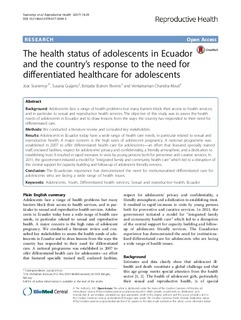The health status of adolescents in Ecuador and the country’s response to the need for differentiated healthcare for adolescents
Journal article, Peer reviewed
Permanent lenke
http://hdl.handle.net/11250/2491567Utgivelsesdato
2017-01-01Metadata
Vis full innførselSamlinger
- Publications [1488]
Sammendrag
Background Adolescents face a range of health problems but many barriers block their access to health services, and in particular to sexual and reproductive health services. The objective of this study was to assess the health needs of adolescents in Ecuador and to draw lessons from the ways the country has responded to their need for differentiated care.
Methods We conducted a literature review and consulted key stakeholders.
Results Adolescents in Ecuador today have a wide range of health care needs, in particular related to sexual and reproductive health. A major concern is the high rates of adolescent pregnancy. A national programme was established in 2007 to offer differentiated health care for adolescents—an effort that featured specially trained staff, enclaved facilities, respect for adolescents’ privacy and confidentiality, a friendly atmosphere, and a dedication to establishing trust. It resulted in rapid increases in visits by young persons both for preventive and curative services. In 2011, the government initiated a model for “integrated family and community health care” which led to a disruption of the central support for capacity building and follow-up of adolescent friendly services.
Conclusion The Ecuadorian experience has demonstrated the need for institutionalised differentiated care for adolescents who are facing a wide range of health issues.
